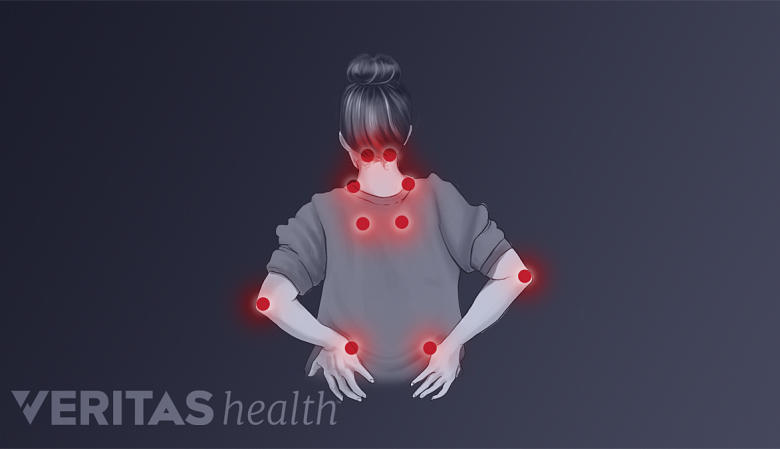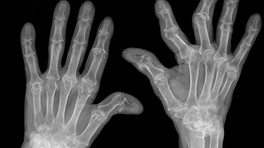A number of specialists treat fibromyalgia, and many people with the condition work with a health care team, rather than a single doctor, to relieve the wide range of symptoms typical of fibromyalgia.
Fibromyalgia can have many symptoms, and often a treatment team includes multiple specialties.
In This Article:
In some cases, one specialist serves as the lead doctor, coordinating care with other health care providers. The lead doctor may be a family physician, rheumatologist, internist, neurologist, or another specialist. Most people with fibromyalgia are treated by primary care doctors. 1 Arnold LM, Gebke KB, Choy EH. Fibromyalgia: management strategies for primary care providers. Int J Clin Pract. 2016;70(2):99-112.
When a rheumatologist is not the lead doctor, the individual may be referred to a rheumatologist to confirm a diagnosis of fibromyalgia. Rheumatologists specialize in painful conditions that involve the joints, muscles, tendons, and ligaments, and fibromyalgia is considered a rheumatic condition. A National Fibromyalgia Association online survey found almost half of the respondents were diagnosed by a rheumatologist. 2 Fibromyalgia in Primary Care: Incorporating Patient Insights into Patient Care. National Fibromyalgia Association.
Treating Symptoms of Fibromyalgia and Coexisting Conditions
Common fibromyalgia symptoms include fatigue, pain and stiffness, sleep difficulties, and cognitive issues, but other symptoms may also be experienced. Many people also have one or more serious coexisting conditions with fibromyalgia, such as systemic lupus erythematosus, ankylosing spondylitis, rheumatoid arthritis, or irritable bowel syndrome.
See Characteristic Symptoms of Fibromyalgia
The lead doctor may recommend one or more of the following specialists to help with symptoms of fibromyalgia or coexisting conditions:
- Alternative medicine practitioner, such as a massage therapist or acupuncturist
- Chiropractor
- Nutritionist
- Pain specialist
- Physiatrist (physical medicine and rehabilitation specialist)
- Physical and/or occupational therapist
- Psychologist
- Sleep specialist
See Arthritis Treatment Specialists
Treatment by one or more of these specialists may be short term or long term, depending on the patient’s needs.
See Physiatrist for Arthritis Treatment
Fibromyalgia clinics and pain clinics (also called pain management clinics) are available in some areas. These clinics offer the advantage of multiple specialists under one roof.
Choosing a Doctor to Treat Fibromyalgia
With multiple potential symptoms and no single widely effective treatment method, fibromyalgia can be challenging for both doctor and patient. There is typically some trial-and-error involved in finding the most effective medication, diet, type of exercise and therapy.
See Multi-Specialty Fibromyalgia Treatment
The need to work closely together to ease pain and improve functioning should be taken into account when choosing a doctor. Getting answers to these questions may help in selecting the best doctor for an individual:
- How many people with fibromyalgia has the doctor treated?
- Is the doctor a good listener?
- What does the doctor think about alternative medicine?
- Does the doctor typically recommend physical therapy and/or chiropractic care?
- How does the doctor see the role of the patient?
- Does the doctor show empathy?
See Other Specialists for Arthritis Treatment
Once a doctor has been selected, the individual may benefit from planning ahead to make the most out of each office visit. It is often helpful to write down a brief description of symptoms in order of importance and bring the list to the next appointment.
See How Mind-Body Techniques Help With Fibromyalgia
This list helps the individual think through the symptoms in a low-stress environment and ensures that nothing is overlooked during the office visit.
See Fibromyalgia or Not? 6 Conditions to Know
The doctor may also have the patient fill out a couple of questionnaires that can help diagnose the condition as well as to help track improvement over time to determine treatment effectiveness. These tools can be particularly helpful in the when managing patients with fibromyalgia. 3 Bennett RM, Friend R, Jones KD, Ward R, Han BK, Ross RL. The Revised Fibromyalgia Impact Questionnaire (FIQR): validation and psychometric properties. Arthritis Res Ther. 2009; 11(4):R120. Epub 2009 Aug 10. Erratum in: Arthritis Res Ther. 2009; 11(5):415. , 4 Wolfe F, Clauw DJ, Fitzcharles M-A, et al. The American College of Rheumatology Preliminary Diagnostic Criteria for Fibromyalgia and Measurement of Symptom Severity. Arthritis Care & Research 62(5):600-10, www.scribd.com/document/178989269/2010-ACR-CRITERIA-pdf.
- 1 Arnold LM, Gebke KB, Choy EH. Fibromyalgia: management strategies for primary care providers. Int J Clin Pract. 2016;70(2):99-112.
- 2 Fibromyalgia in Primary Care: Incorporating Patient Insights into Patient Care. National Fibromyalgia Association.
- 3 Bennett RM, Friend R, Jones KD, Ward R, Han BK, Ross RL. The Revised Fibromyalgia Impact Questionnaire (FIQR): validation and psychometric properties. Arthritis Res Ther. 2009; 11(4):R120. Epub 2009 Aug 10. Erratum in: Arthritis Res Ther. 2009; 11(5):415.
- 4 Wolfe F, Clauw DJ, Fitzcharles M-A, et al. The American College of Rheumatology Preliminary Diagnostic Criteria for Fibromyalgia and Measurement of Symptom Severity. Arthritis Care & Research 62(5):600-10, www.scribd.com/document/178989269/2010-ACR-CRITERIA-pdf.











